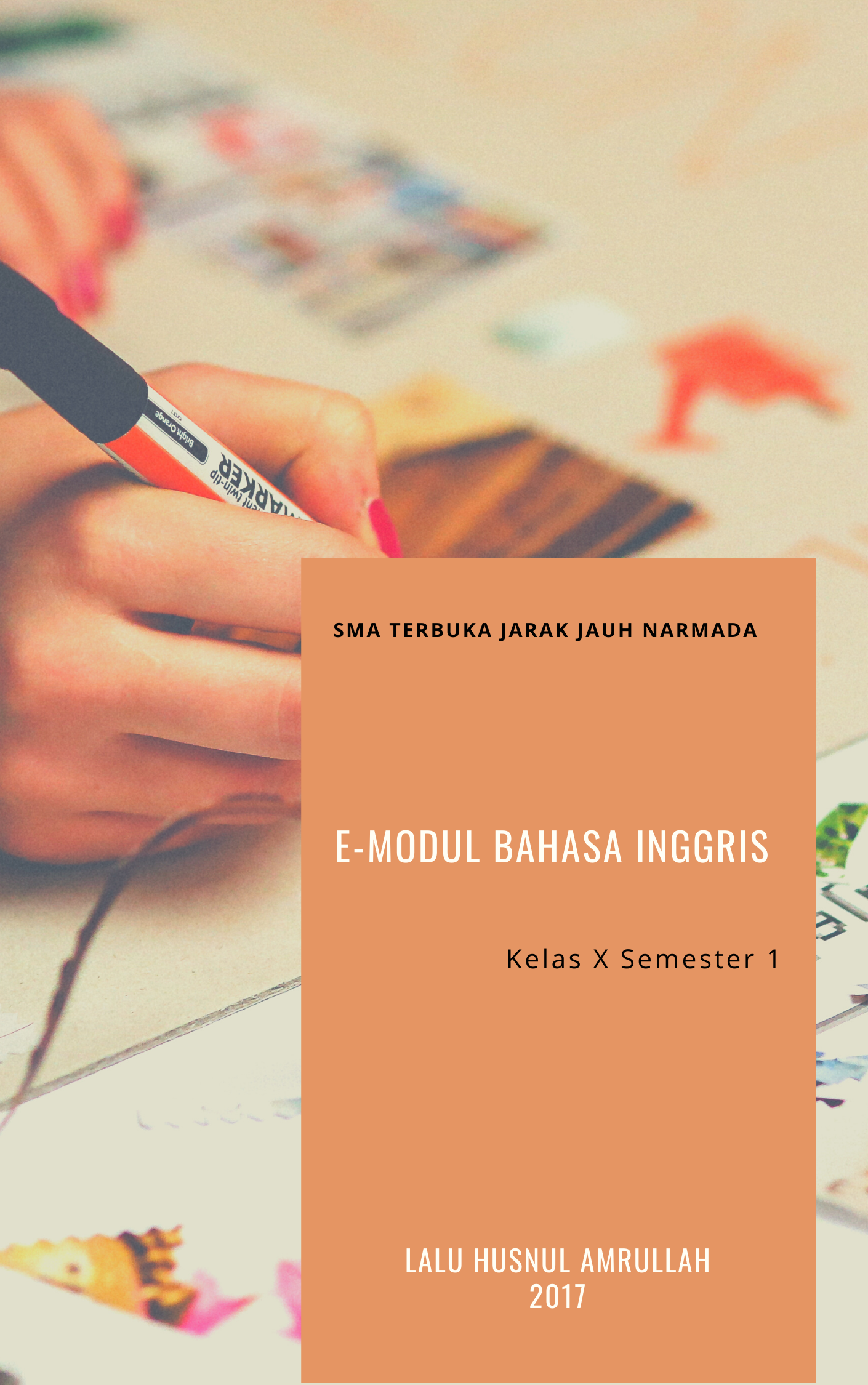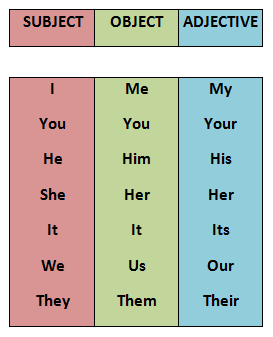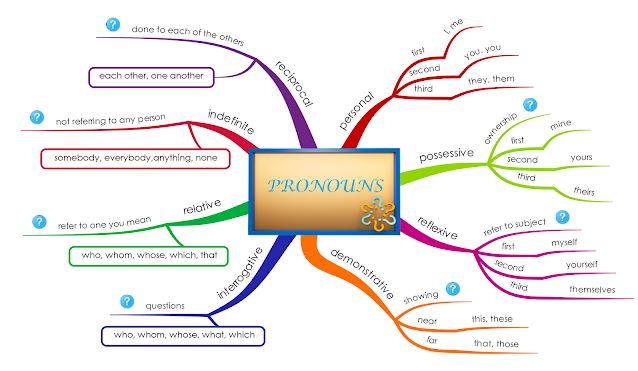Pronouns
| Site: | E-Learning SMA Terbuka Jarak Jauh Narmada |
| Course: | e-Modul Bahasa Inggris Kelas X |
| Book: | Pronouns |
| Printed by: | Guest user |
| Date: | Friday, 26 December 2025, 2:02 PM |
1. cover

2. Penyusun

3. Daftar Isi
4. Daftar Pustaka
Daftar Pustaka
Widiati, Utami. Zuliati Rohmah. Furaidah. 2016. Bahasa Inggris SMA/MA/SMK/MAK KELAS X. Jakarta: Kementrian Pendidikan dan Kebudayaan.
http://upsrenglishmindmap.blogspot.com/
https://www.gingersoftware.com/content/grammar-rules/pronouns-2/
5. Peta Konsep
6. Glosarium
Glosarium
-
Pronoun kata ganti
-
Subjective Pronoun kata ganti subjek
-
Objective Pronoun kata ganti objek
-
Indefinite pronouns – those referring to one or more unspecified objects, beings, or places, such as someone, anybody, nothing.
-
Personal pronouns – those associated with a certain person, thing, or group;
-
Reflexive pronouns – those preceded by the adverb, adjective, pronoun, or noun to which they refer, and ending in –self or –selves.
-
Demonstrative pronouns – those used to point to something specific within a sentence. There are only four demonstrative pronouns – this, that, these, those – but the usage can be a bit tricky at times.
-
Possessive pronouns – those designating possession or ownership. Examples include: mine, its, hers, his, yours, ours, theirs, whose.
-
Possessive pronoun examples in the following sentences are in bold for easy identification.
-
Relative pronouns –those which refer to nouns mentioned previously, acting to introduce an adjective (relative) clause.
-
Interrogative pronouns –Those which introduce a question. Examples include: who, whom, whose, what, which.
-
Reciprocal pronouns –Those expressing mutual actions or relationship; i.e. one another.
-
Intensive pronouns – those ending in –self or –selves and that serve to emphasize their antecedents. These are almost identical to reflexive pronouns, but rather than just referring back to the subject of the sentence they work to reinforce the action. In many cases, the sentence would still make sense without the intensive pronoun.
7. *
Pendahuluan
IDENTITAS modul
| Nama Mata Pelajaran | : | Bahasa Inggris |
| Kelas / Semester / Alokasi Waktu | : | X /1 (Ganjil) / 4 JP |
| Judul eModul | : | Pronouns |
KOMPETENSI Dasar
| 3.1 |
Menerapkan fungsi sosial, struktur teks, dan unsur kebahasaan teks interaksi transaksional lisan dan tulis yang melibatkan tindakan memberi dan meminta informasi terkait jati diri dan hubungan keluarga, sesuai dengan konteks penggunaannya. (Perhatikan unsur kebahasaan pronoun, subjective, objective, possessive).
|
| 4.1 |
Menyusun teks interaksi transaksional lisan dan tulis pendek dan sederhana yang melibatkan tindakan memberi dan meminta informasi terkait jati diri dengan memperhatikan fungsi sosial, struktur teks, dan unsur kebahasaan yang benar dan sesuai konteks.
|
Deskripsi
Hai guys, Modul pembelajaran ini merupakan media pendukung bagi peserta didik dalam memahami materi tentang part of speech dalam hal ini yang akan di bahas adalah pronoun pada mata pelajaran Bahasa Inggris kelas X semester 1. Kompetensi Dasar 3.1 Membedakan fungsi sosial, struktur teks, dan unsur kebahasaan beberapa teks interaksi transaksional lisan dan tulis yang melibatkan tindakan memberi dan meminta informasi terkait jati diri dan hubungan keluarga, sesuai dengan konteks penggunaannya,
Adapun materi yang harus dikuasai oleh peserta didik antara lain: Subjective pronoun, objective pronoun, dan possessive adjective.
Semoga modul ini sangat menjadi bermanfaat dan dapat di pahami oleh siswa, dan dapat dijadikan sumber belajar Bahasa Inggris.
Petunjuk Penggunaan Modul
-
Bacalah modul ini secara berurutan dan pahami isinya.
-
Laksanakan semua tugas-tugas yang ada dalam modul ini agar kompetensi anda berkembang sesuai kompetensi yang diharapkan.
-
Setiap mempelajari materi, anda harus mulai dari menguasai pengetahuan pendukung (uraian materi) melaksanakan tugas-tugas, mengerjakan lembar latihan.
-
Dalam mengerjakan lembar latihan, anda jangan melihat kunci jawaban terlebih dahulu sebelum anda menyelesaikan lembar latihan.
-
Laksanakan lembar kerja untuk pembentukan keterampilan sampai anda benar-benar terampil sesuai kompetensi.
-
Konsultasikan dengan guru apabila anda mendapat kesulitan dalam mempelajari modul ini.
"Pendidikan setingkat dengan olahraga dimana memungkinkan setiap orang untuk bersaing" – Joyce Meyer
"Sekolah maupun kuliah tidak mengajarkan apa yang harus kita pikirkan dalam hidup ini. Mereka mengajarkan kita cara berpikir logis, analitis dan praktis." – Azis White.
materi pembelajaran
Materi kali ini membahas tentang Pronoun, dalam pengertian bahasa inggris "Pronoun" is a word that takes the place of a noun, such as: I, you, me, it, they, we, she, him, us.
Atau dalam Bahasa Indonesia biasa kita sebut pronoun itu adalah "kata ganti", contoh: Saya, kamu, dia, kita, mereka, dll.
8. Kegiatan Pembelajaran
Kegiatan Pembelajaran
1. tujuan
-
Mengidentifikasi makna, tujuan komunikasi, struktur teks, dan unsur bahasa yang terdapat dalam teks interaksi transaksional lisan dan tulis yang terkait dengan jadi diri, dan hubungan keluarga sesuai dengan konteks penggunaan.
-
Meminta dan memberi informasi tentang jati diri dan hubungan keluarga dengan menggunakan struktur teks yang tepat sesuai konteks penggunaan.
-
Mememinta dan memberi informasi tentang jati diri dan hubungan keluarga dengan menggunakan unsur bahasa (pronoun, subjective, objective, possesive) yang tepat sesuai konteks penggunaan.
Sumber:

Dokumen Pribadi Penyusun
-
Pronouns
-
Kinds of Pronoun
- How to use Pronoun in the sentence
" Setitik embun dapat melembabkan daun daunan, sederas hujan dapat membahasi daun beserta dahannnya sungguh ilmu yang kamu dapat pada kami bagaikan hujan deras yang tak pernah berhenti membahasi kami. kami tumbuh dan berkembang dan selanjutnya memekari seluruh sekitar kami dan akhirnya membuat mahluk ciptaan Tuhan menjadi bahagia dengan keberadaan kami. Terima kasih telah menjadi hujan deras buat otak dan akhlak kami."
2. uraian materi
2.1. Pronoun:
3. Rangkuman
A pronoun is defined as a word or phrase that is used as a substitution for a noun or noun phrase, which is known as the pronoun’s antecedent.
- Indefinite pronouns
- Personal pronouns
- Reflexive pronouns
- Demonstrative pronouns
- Possessive pronouns
- Relative pronouns
- Interrogative pronouns
- Reciprocal pronouns
- Intensive pronouns
“Jika kamu tidak mengejar apa yang kamu inginkan, maka kamu tidak akan mendapatkannya. Jika kamu tidak bertanya maka jawabannya adalah tidak. Jika kamu tidak melangkah maju, kamu akan tetap berada di tempat yang sama ”
9. Essay Exercise
Essay Exercise
- This is __________ speaking.
- The dog chewed on __________ favorite toy.
- It could have been __________ .
- Beny is taller than __________ am.
- Stevany is as smart as __________ is.
10. Latihan Pilihan Ganda
Latihan Pilihan Ganda
| 1. | This building is so expensive for ___ . We can’t pay such a high rent. We need to think again. |
|
| them | ||
| her | ||
| us | ||
| their | ||
| we | ||
| 2. | I need help to finish ___ work. I am so busy these days. I am not feeling well now. | |
| me | ||
| my | ||
| mine | ||
| them | ||
| they | ||
| 3. | I can’t read the map. Would help me, please? | |
| I | ||
| our | ||
| your | ||
| you | ||
| mine | ||
| 4. | If you see my family next weekend, give ___ my best regards and don’t forget to bring the gifts. | |
| us | ||
| them | ||
| it | ||
| its | ||
| we | ||
| 5. | Rina felt worried about the children, so she asked ___ husband not to go abroad for the job. | |
| his | ||
| her | ||
| them | ||
| us | ||
| its | ||
| 6. | We meet ___ friends at the mall yesterday. | |
| me | ||
| mine | ||
| them | ||
| its | ||
| our | ||
| 7. | In spite of her friends’ complaints, he decided to live with ___ friend in Los Angeles. | |
| us | ||
| him | ||
| our | ||
| her | ||
| his | ||
| 8. | I can’t find _____. Does _____ steal it? | |
| (he/him | ||
| (she/her) | ||
| (it/they) | ||
| (you/your) | ||
| (mine/he) | ||
| 9. | My brother works in a big factory. _____ says that _____ is a nice place. | |
| (you/me) | ||
| (they/them) | ||
| (she/her) | ||
| (their/us) | ||
| (he/it) | ||
| 10. | My name is Yona and______name is Sinta | |
| his | ||
| your | ||
| him | ||
| her | ||
| their | ||
11. Penilaian Diri
Penilaian Diri
At the end of this chapter, ask yourself with the questions than answer honestly and responsibly!
| No. | Pertanyaan | Jawaban | |
|---|---|---|---|
| 01. | Apakah Anda terbantu dengan adanya Emodul ini? | Yes | No |
| 02. | Apakah Anda memahami penjelasan tentang pronoun? | Yes | No |
| 03. | Apakah Anda tertarik dengan materi pronoun? | Yes | No |
| 04. | Apakah Anda mengerti jenis-jenis pronoun? | Yes | No |
| 05. | Apakah Anda merasa tertarik untuk mempelajari materi pronoun lebih mendalam? | Yes | No |
If there is an answer "No", go to the review, particularly in the answer of "No".
12. Evaluasi
Evaluasi
Soal 1.
My name is yona and______name is Sinta
| A. | his |
| B. | her |
| C. | your |
| D. | their |
| E. | him |
Soal 2.
In spite of her friends’ complaints, he decided to live with ___ girl friend in Los Angeles.
| A. | him |
| B. | her |
| C. | his |
| D. | our |
| E. | us |
Soal 3.
If you to see my family next weekend, give ___ my best regards and don’t forget to bring the gifts.
| A. | us |
| B. | them |
| C. | its |
| D. | it |
| E. | we |
Soal 4.
I can’t understand ___ when they speak Spain. They seem weird. They should study more.
| A. | me |
| B. | his |
| C. | her |
| D. | her |
| E. | them |
Soal 5.
We can find the magazine in the library. is very complete. We can find various books there.
| A. | my |
| B. | we |
| C. | they |
| D. | she |
| E. | it |
Soal 6.
Nana felt worried about the children, so she asked ___ husband not to go abroad for the job.
| A. | his |
| B. | her |
| C. | their |
| D. | its |
| E. | him |
Soal 7.
We meet ___ friends at the mall yesterday.
| A. | our |
| B. | your |
| C. | its |
| D. | it |
| E. | me |
Soal 8.
This building is so expensive for ___ . We can’t pay such a high rent. We need to think again.
| A. | them |
| B. | her |
| C. | us |
| D. | it |
| E. | him |
Soal 9.
I need help to finish ___ work. I am so busy these days. I am not feeling well now.
| A. | my |
| B. | me |
| C. | their |
| D. | mine |
| E. | them |
Soal 10.
I don’t know how to say it to ___ that I love him. It is so difficult to say. Any idea?
| A. | it |
| B. | him |
| C. | his |
| D. | its |
| E. | their |
| Value | Description |
|---|---|



